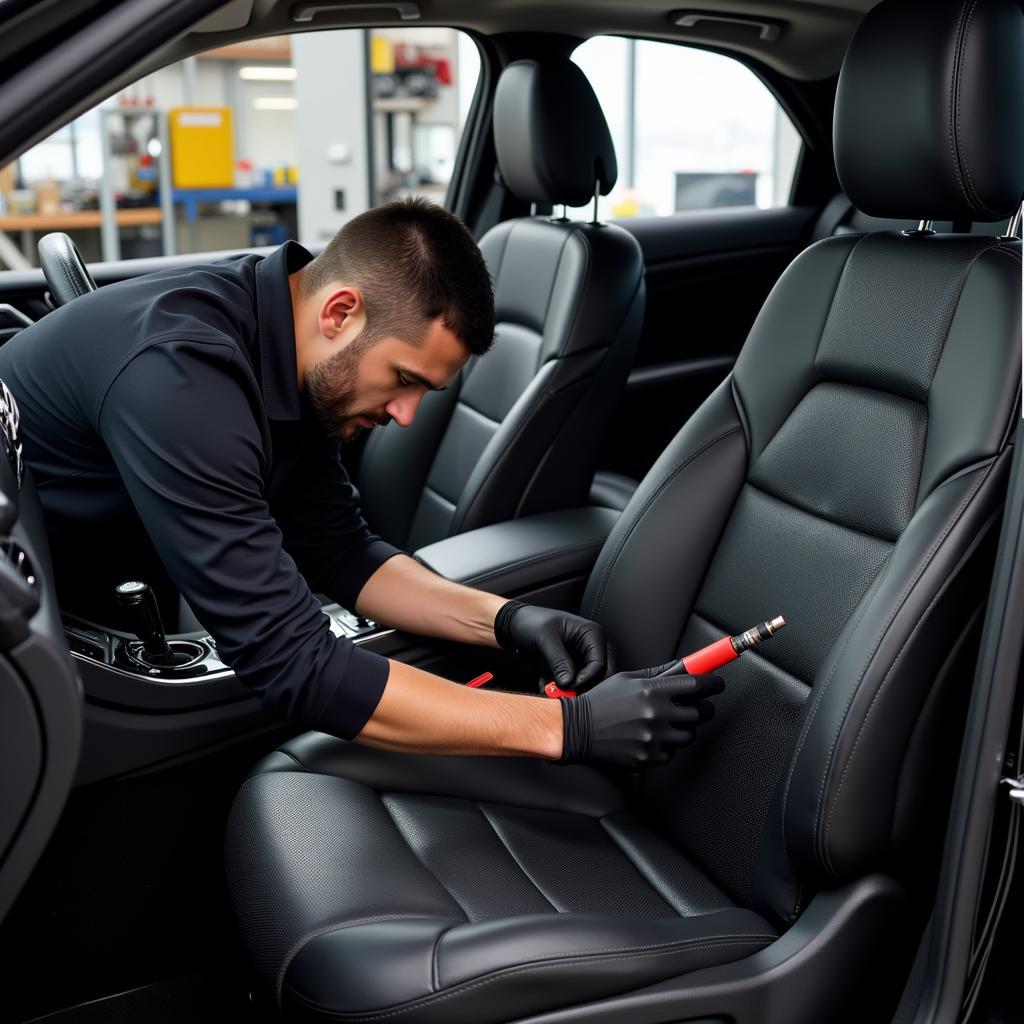Rust holes are a common problem for car owners, especially in areas with harsh weather conditions. Finding the best way to fix these rust holes is crucial for preserving your car’s value and structural integrity. This article provides comprehensive guidance on effectively addressing rust issues, from minor surface rust to larger, more complex holes.
Dealing with rust early is key to preventing further damage. Minor rust can often be addressed with rust converters or sandpaper, while larger holes require more involved repairs. Let’s explore the various methods available for fixing rust holes on a car, from DIY solutions to professional repairs. Check out how to fix car decals for tips on fixing aesthetic issues on your car.
Assessing the Damage: How Bad is the Rust?
Before diving into repairs, it’s essential to assess the extent of the rust damage. Surface rust is relatively easy to fix, while deeper rust penetration requires more extensive work. Identifying the type of rust helps determine the best course of action.
Identifying Different Types of Rust
- Surface Rust: This appears as discoloration on the paint surface and can often be removed with sandpaper or a wire brush.
- Scale Rust: This type of rust forms flakes and requires more aggressive removal methods like sanding or media blasting.
- Penetrating Rust: This is the most severe type, creating holes in the metal. It often requires patching or welding.
After assessing the damage, you can determine if it’s a DIY project or if you need professional help. For minor rust repair, you might consider visiting Auto Fix Car Care Center.
DIY Rust Repair: Small Holes and Surface Rust
For smaller rust holes and surface rust, DIY repairs are often feasible. This typically involves sanding the affected area, applying a rust converter, and filling the hole with body filler. Remember to wear appropriate safety gear like gloves and eye protection.
Step-by-Step Guide to DIY Rust Repair
- Clean the Area: Thoroughly clean the rusted area with soap and water, removing any dirt or debris.
- Sand the Rust: Use sandpaper or a wire brush to remove the rust, exposing bare metal.
- Apply Rust Converter: Apply a rust converter to the affected area, following the manufacturer’s instructions.
- Apply Body Filler: Fill the hole with body filler, smoothing it out with a putty knife.
- Sand and Prime: Once the filler dries, sand the area smooth and apply primer.
- Paint and Finish: Paint the repaired area to match the car’s color and apply a clear coat for protection.
“When dealing with rust, preparation is key,” advises John Smith, Automotive Repair Specialist at Smith Auto Repair. “Properly cleaning and sanding the area ensures the rust converter and body filler adhere effectively.” You can find helpful resources on car repair at car fix automotive & tire center.
Professional Rust Repair: Large Holes and Structural Damage
For larger rust holes or structural damage, professional repair is recommended. This often involves welding in new metal patches or replacing entire panels. Professional repair ensures a long-lasting and structurally sound fix. If you’re in Griffin, GA, you could check out Auto Fix Car Care Centerin Griffin GA.
When to Seek Professional Help
- Large Rust Holes: Holes larger than a few inches in diameter often require professional welding.
- Structural Damage: Rust affecting structural components requires specialized expertise.
- Lack of Experience: If you’re not comfortable with DIY repairs, it’s best to consult a professional.
“Rust can significantly compromise a car’s structural integrity,” explains Jane Doe, Lead Mechanic at Doe Automotive. “Professional repairs ensure the vehicle is safe and roadworthy.”
Conclusion: Protecting Your Car from Rust
Finding the Best Way To Fix Rust Holes On A Car depends on the severity of the damage. DIY repairs are suitable for minor rust, while professional help is necessary for larger holes and structural issues. Addressing rust promptly is essential for maintaining your car’s value and safety. Need further assistance with your car repair? Contact us at AutoTipPro at +1 (641) 206-8880 or visit our office at 500 N St Mary’s St, San Antonio, TX 78205, United States.
FAQ
- Can I prevent rust from forming on my car? Regular washing, waxing, and undercoating can help prevent rust.
- What is the best rust converter to use? Several reputable brands offer effective rust converters; research and choose one that suits your needs.
- Is it worth fixing rust on an old car? The cost of repair versus the car’s value should be considered.
- How long does a rust repair typically last? With proper care, a professional rust repair can last for several years.
- Can I use fiberglass instead of body filler for rust repair? Fiberglass is generally not recommended for rust repair on car bodies, as it can crack over time.
- How can I tell if rust has damaged the car’s structure? Look for signs of weakness, such as flexing or unusual noises, and consult a professional for inspection.
- Does FWCS Career Academy Automotive Center fix cars? While we don’t have information about that, consider does fwcs career academy automotive center fix cars for more details.





Leave a Reply